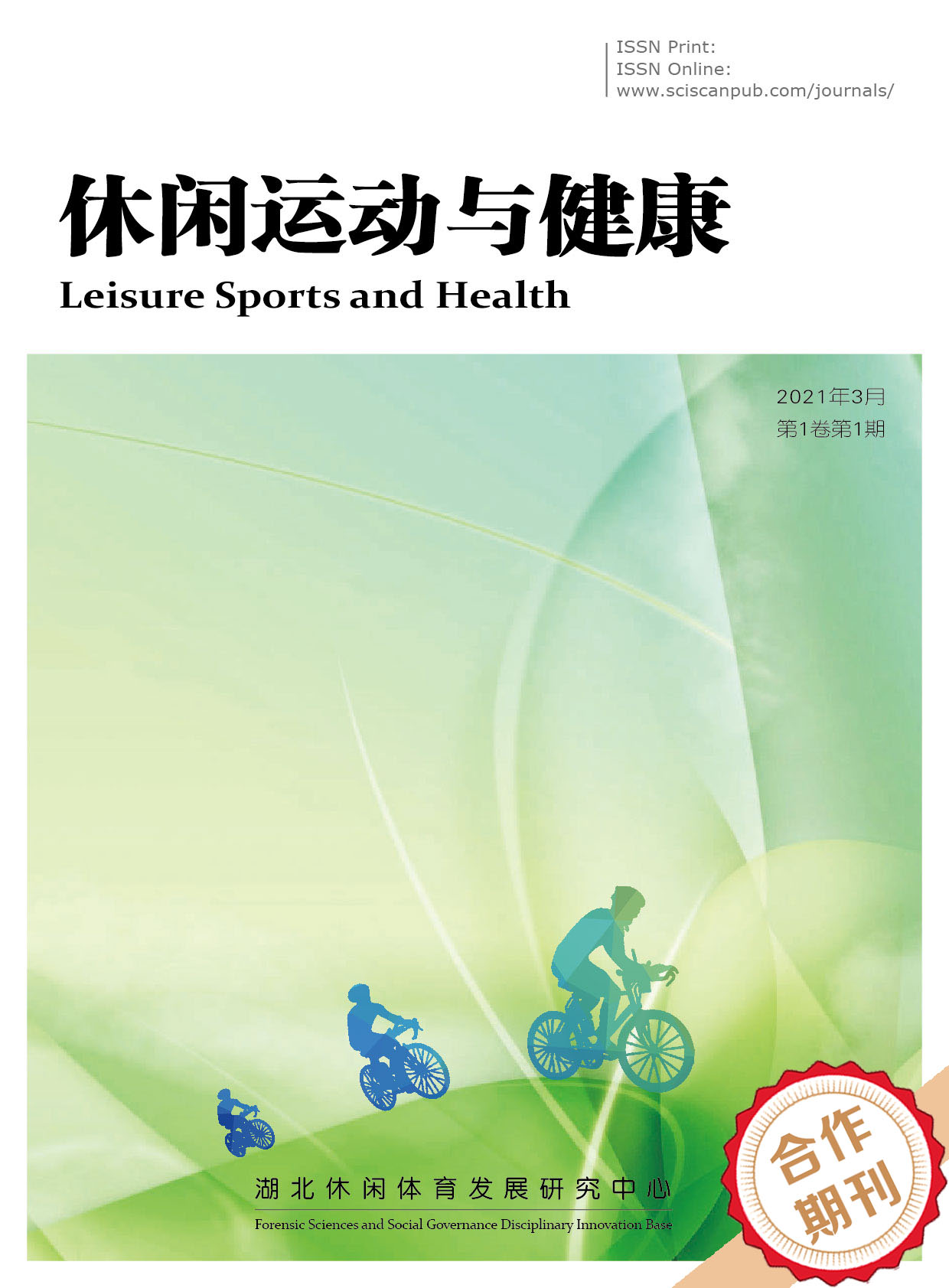Leisure Sports and Health
2024年全国武术套路锦标赛湖北队竞技表现对比分析
Analysis of Competitive Performance of Hubei Team at the 2024 National Wushu Routine Championships
- Authors: 李璐瑶 梅林琦
-
Information:
湖北大学体育学院,武汉
-
Keywords:
National Games; Wushu routine; Hubei Team全运会; 武术套路; 湖北队
- Abstract: This study analyzes the competitive performance of the Hubei Team in Wushu routine events over three consecutive National Games failures and their results in the 2024 National Wushu Routine Championship, Resurrection match, and Championship match. Using literature review, mathematical statistics, and comparative analysis, the study identifies key issues: In team events, the Hubei Team faced frequent penalty points due to movement quality. In men’s individual all-around, they excelled in Taijiquan but did not participate in Changquan, Daoshu, or Gunshu. In women’s individual all-around, they advanced to the championship in Nanquan, Nandao, and Nanbaton but did not compete in Changquan, Jianshu, or Qiangshu. The results indicate a clear trend of project differentiation within the Hubei Team’s performance, with team events hindered by movement quality, men’s all-around showing strengths but gaps in certain events, and women’s all-around excelling in southern-style events while neglecting northern-style events. This analysis aims to provide insights into optimizing the Hubei Team’s Wushu routine training methods to enhance their overall competitive performance. 本研究以湖北队武术套路连续三届无缘全运会的现状为背景,通过文献资料法、数理统计法、对比分析法,分析2024年全国武术套路锦标赛、复活赛及冠军赛三场比赛湖北队的成绩。研究结果显示:在团体项目中,湖北队面临的主要问题是动作质量扣分频繁;在男子个人全能项目中,湖北队在太极拳项目中表现出色,但在长拳、刀术、棍术等项目中未派出选手参赛;在女子个人全能项目中,湖北队在南拳、南刀、南棍项目中全部晋级冠军赛,然而在长拳、剑术、枪术项目中未派出选手参加。通过比赛结果可以得知,湖北队在本次武术套路比赛中呈现出明显的项目分化态势,团体项目受动作质量拖累,男子全能项目太极拳强势但其他项目缺位,女子全能项目南派项目出色却北派项目空白。本文旨在深入分析湖北队在三场关键比赛中的竞技表现,识别影响其表现的关键因素。通过对这些因素的系统分析,为湖北队的武术套路训练方法提供参考,以期优化并改善其在竞技场上的整体表现。
- DOI: https://doi.org/10.35534/lsh.0404015
- Cite: 李璐瑶,梅林琦.2024年全国武术套路锦标赛湖北队竞技表现对比分析[J].休闲运动与健康,2024,4(4):84-90.
竞技武术套路是一种区别于传统武术的中西体育文化融合的产物,是武术现代化的体现。[1]竞技武术套路比赛包含拳术、器械、对抗等比赛项目,分为个人和团体两种比赛方式,裁判员依据动作质量、演练水平、动作难度来对其进行评判,从而决定最终的比赛成绩。[2]竞技武术套路是传统武术在传承与发展过程中,为了适应现代竞技体育的规则而逐渐演化出的一种新的表现方式。它不仅保留了传统武术中蕴含的美学和精神文化精髓,还融入了现代体育对竞技性和技击性的要求,展现出独特的艺术魅力。[3]按照运动训练学“项群理论”的划分,武术套路属于技能类表现难美性运动项目。[4]武术套路美的独特之处在于,它是在武术攻防属性下表现出的一种人类运动之美。[5]
自2009年第十一届全运会以来,湖北队已连续三届近十年无缘全运会参赛资格。本文深入分析了2024年全国武术套路锦标赛、复活赛和冠军赛中湖北队的表现,以锦标赛全国第一为标准,通过横向对比湖北队各项目在锦标赛和复活赛中的成绩差异,纵向对比湖北队与复活赛第一名的差距,结合第十四届全运会竞赛规程的项目分类,对成绩进行了细致的整理与分析。[6]这一研究不仅揭示了湖北队在竞技武术领域的现状,而且为湖北队未来的发展提供了宝贵的参考和启示。
1 研究对象与方法
1.1 研究对象
以2024年全国武术套路锦标赛、复活赛和冠军赛各项目第一名竞技表现及湖北队参赛队员竞技表现为研究对象。
1.2 研究方法
1)文献资料法
对2024年全国武术套路锦标赛、复活赛及冠军赛成绩进行分析,通过中国知网、万方数据库等搜索工具查阅相关文献,为本文提供理论支撑。
2)数理统计法
运用Excel 2010将2024年全国武术套路锦标赛、复活赛及冠军赛三场比赛收集的数据进行整理统计以及Origin 2024将湖北队各项目动作质量扣分频次绘制成图表。根据第十四届全运会武术套路项目竞赛规程,将项目分为团体、男子个人全能和女子个人全能三大类进行统计,对各类别项目进行对比分析,为本文撰写提供数据支持。
3)对比分析法
横向对比湖北队在锦标赛与复活赛两场比赛中的成绩差异,纵向对比复活赛湖北队与第一名成绩差距,对各项目动作质量、演练水平、动作难度三组细节得分进行对比分析。根据第十四届全运会武术套路项目竞赛规程将项目分成三大类,以每个项目的扣分动作出现频次绘图,分别是锦标赛高频橙色、中频紫色、低频蓝色;复活赛高频绿色、中频黄色、低频粉色。因湖北队只在部分项目中晋级冠军赛,故动作质量扣分频次图中未体现冠军赛动作质量扣分频次。
2 研究结果与分析
2.1 团体项目成绩对比分析
团体项目分为男子枪术、剑术、三人对练,女子刀术、棍术、二人对练六项。其中对练项目较为特殊,是中国武术中的一项重要内容和练习形式,它是在各种单练项目的基础上,二人或多人按照所编排的套路,进行攻击与防守的方法练习。对练套路则是“遵循攻防合理的技击原则,由拳术的踢、打、摔、拿等动作及器械的各种技击动作所组成”的技法组合或程式。[7]通过分析表1团体项目中各项目得分可知湖北队的表现如下:湖北队在男子枪术这一项目上,锦标赛与复活赛成绩相差0.94分,锦标赛排名第33,复活赛排名第15。主要的差距体现在难度得分上。复活赛中与第一名相差0.646分,同时在动作质量方面,躯干移动跳动是动作质量出现扣分的主要问题,锦标赛出现一次、复活赛出现两次;湖北队在男子剑术项目上,前后两次比赛相差0.733分,复活赛中与第一名相差1.13分,在复活赛中三组细节评分均显示出差距,且在动作质量上频繁出现躯干晃动和马步步型扣分等问题,分别为锦标赛出现四次躯干晃动扣分、一次马步步型扣分以及一次跌竖叉扣分,复活赛中出现一次躯干晃动扣分及两次马步步型扣分;在男子三人对练项目中,湖北队前后两次比赛分数差距为0.357分,复活赛中与第一名差距为0.26分。在细节分析中发现,湖北队在动作质量上出现了多次扣分,尤其是配合问题成为了主要的扣分点,在锦标赛中出现了六次、复活赛中出现了一次。
分析团体项目中女子项目可知,湖北队在女子刀术项目上,前后差距0.267分,复活赛中与第一名相差0.75分。分析细节得分可知,差距主要在于难度得分的扣分,与复活赛第一名相差了0.8分;在女子棍术这一项目中,两场比赛前后差距0.72分,在复活赛中与第一名相差0.276分。分析细节得分可知,差距主要在于动作质量及难度得分的扣分,在锦标赛中出现了两次躯干晃动扣分及一次附加支撑扣分,在复活赛中躯干晃动、附加支撑及马步步型均出现了扣分。在锦标赛女子二人对练项目中,湖北队选择了弃权,分析复活赛中湖北队与第一名差距可知,主要得分差异还是在演练水平,相差0.183分。团体项目动作质量扣分频次统计情况如图1所示。
表 1 团体项目成绩对比一览表
| 湖北队锦标赛(C1) | 湖北队复活赛(C2) | 复活赛第一名(C3) | 差值1(C1:C2) | 差值2(C2:C3) | |
| 枪术男 | 4.9+2.510+0.7 | 4.8+2.600+1.65 | 5+2.696+2 | 0.940 | 0.646 |
| 剑术男 | 4.4+2.430+1 | 4.7+2.563+1.3 | 5+2.693+2 | 0.733 | 1.13 |
| 三人对练男 | 4.4+4.546 | 4.8+4.503 | 5+4.563 | 0.357 | 0.26 |
| 刀术女 | 5.0+2.483+1.2 | 5.0+2.483+1.2 | 5+2.750+2 | 0.267 | 0.75 |
| 棍术女 | 4.4+2.480+1 | 4.4+2.480+1 | 5+2.790+2 | 0.720 | 0.276 |
| 二人对练女 | 5.0+4.290 | 5+4.473 | 0.183 |

图 1 团体项目动作质量扣分频次图
综上所述,在团体项目中湖北队各小项均无法进入冠军赛。通过分析,可以看出湖北队在团体项目中存在一些需要改进的地方,特别是在难度动作的选择和执行以及动作质量的稳定性方面。湖北队在复活赛中虽然有所进步,但在动作质量、演练水平和难度完成方面仍有待提高。湖北队可以通过加强技术训练、提高动作的准确性和稳定性,以及增强运动员之间的配合来提升整体表现。通过这些针对性的训练和调整,在未来的比赛中有望取得更好的成绩。
2.2 男子个人全能项目成绩对比分析
男子个人全能项目分为长拳、刀术、棍术个人全能;南拳、南刀、南棍个人全能;太极拳、太极剑个人全能三个个人全能项目。分析2024年全国武术套路锦标赛成绩可知,湖北队在男子长拳、刀术、棍术这一项目中未派出选手参赛,因此在男子个人全能项目中,本研究只分析另外两个个人全能项目的成绩。
自1960年国家体委(现国家体育总局)将“南拳”列为全国武术竞赛项目之日起,南拳就伴随着中国武术的发展而不断充实并完善。南拳现已与长拳、太极拳一起,成为了规范中国武术竞赛内容的世界性正式比赛项目。[8]分析表2可知,在锦标赛男子南拳、南刀、南棍个人全能项目中,湖北队前后两场比赛差距不大,主要是在演练水平得分上有所差异。分析细节可知,在锦标赛中,男子南棍出现了一次躯干晃动扣分。在复活赛中,湖北队与第一名的差距主要体现在演练水平上,具体到各个单项可知,湖北队在南拳项目中与第一名相差0.077分,湖北队处于好档三级而第一名处于好档二级;在南刀项目中,湖北队与第一名相差0.067分,湖北队处于好档三级、第一名处于好档二级;在南棍项目中,湖北队与第一名相差0.037分(如表2所示)。通过细节评分的分析,可以看到湖北队与第一名的主要差距在于演练水平得分,平均相差约0.06分。[9]
表 2 男子南拳、南刀、南棍个人全能项目成绩对比一览表
| 湖北队锦标赛(C1) | 湖北队复活赛(C2) | 复活赛第一名(C3) | 差值1(C1:C2) | 差值2(C2:C3) | |
| 南拳 | 5.0+2.666+2 | 5.0+2.656+2 | 5.0+2.733+2 | -0.01 | 0.077 |
| 南刀 | 5.0+2.686+2 | 5.0+2.646+2 | 5.0+2.713+2 | -0.04 | 0.067 |
| 南棍 | 4.9+2.663+2 | 5.0+2.663+2 | 5.0+2.700+2 | 0.1 | 0.037 |
太极剑是太极拳体系中的著名器械种类。在太极刀、剑、枪、杆等器械中,素以太极剑流传最为广泛。[10]分析表3可知,湖北队在男子太极拳、太极剑个人全能项目上,复活赛相较于锦标赛在动作质量上有所进步。由图2可以看出,在锦标赛中男子太极拳出现了三次躯干晃动扣分,太极剑出现了两次。在复活赛中,太极拳与太极剑都只出现了一次躯干晃动扣分,因此复活赛相较于锦标赛演练水平得分也有所提高。分析复活赛中湖北队与第一名的差距可知,复活赛第一名基本不会出现动作质量扣分的情况,总分上第一名平均比湖北队高0.1分左右。
表 3 男子太极拳、太极剑个人全能项目成绩对比一览表
| 湖北队锦标赛(C1) | 湖北队复活赛(C2) | 复活赛第一名(C3) | 差值1(C1:C2) | 差值2(C1:C3) | |
| 太极拳 | 4.7+2.596+2 | 4.9+2.656+2 | 5.0+2.626+2 | 0.283 | 0.07 |
| 太极剑 | 4.8+2.610+2 | 4.9+2.673+2 | 5.0+2.716+2 | 0.163 | 0.143 |

图 2 男子个人全能项目动作质量扣分频次图
在冠军赛中,湖北队在太极拳项目上与第一名相差0.1分(如表4所示),排名第八。值得注意的是,在冠军赛中湖北队的动作质量没有出现躯干晃动扣分,但主要差距仍然体现在演练水平扣分上。
表 4 2024年全国武术套路冠军赛男子太极拳成绩对比一览表
| 全国第一 | 湖北队第一 | 差值 | |
| 总分 | 9.813 | 9.713 | 0.1 |
| A组评分 | 5 | 5 | 0 |
| B组评分 | 2.813 | 2.713 | 0.1 |
| C组评分 | 2 | 2 | 0 |
综上所述,结合排名情况,在男子南拳、南刀、南棍个人全能项目中湖北队各小项均无法进入冠军赛;在太极拳、太极剑这一个人全能项目中,太极拳成功晋级冠军赛。湖北队在演练水平和动作质量上需要进一步提升。为了在未来的比赛中取得更好的成绩,湖北队可能需要更加注重技术细节的打磨,提高演练水平的稳定性和表现力。同时,针对躯干晃动等动作质量问题,也需要进行专项训练,以减少比赛中的扣分点,提高整体表现。
2.3 女子个人全能项目成绩对比分析
女子个人全能项目与男子一样分为三项,区别在于女子为长拳、剑术、枪术个人全能;南拳、南刀、南棍个人全能;太极拳、太极剑个人全能三个个人全能项目。分析2024年全国武术套路锦标赛成绩可知,湖北队在女子长拳、剑术、枪术这一项目中未派出选手参赛,因此在女子个人全能项目中,本研究也只分析另外两个个人全能项目成绩。
分析女子南拳、南刀、南棍女子个人全能项目在锦标赛中的成绩可知,湖北队在女子南拳、南刀、南棍个人全能项目上的表现显示出了一定的竞争力。具体来看,湖北队在女子南拳项目中排名第14,在南刀项目中排名第11,而在南棍项目中表现较为突出,排名第7,与全国第一名的差距为0.11分,并且湖北队在女子南棍项目中成功晋级了冠军赛。
通过分析得分细节可以发现,在南拳项目中,湖北队在锦标赛中出现了两次马步步型扣分和一次躯干晃动扣分,而在复活赛中湖北队没有出现动作质量扣分。在南刀项目中,湖北队仅在演练水平上前后略有差异。分析复活赛中湖北队与第一名的差距可知,主要弱势还是在演练水平得分上,南拳与第一名相差0.047分,南刀与第一名相差0.037分。具体情况如表5所示。
表 5 女子南拳、南刀、南棍个人全能项目成绩对比一览表
| 湖北队锦标赛(C1) | 湖北队复活赛(C2) | 复活赛第一名(C3) | 差值1(C1:C2) | 差值2(C2:C3) | |
| 南拳 | 4.7+2.646+2 | 5.0+2.676+2 | 5.0+2.723+2 | 0.33 | 0.047 |
| 南刀 | 5.0+2.680+2 | 5.0+2.683+2 | 5.0+2.720+2 | 0.003 | 0.037 |
| 南棍 | 5.0+2.703+2 |
最终通过复活赛的角逐,湖北队女子南拳、南刀、南棍个人全能项目全部进入冠军赛。将这一项目成绩与全国第一名进行成绩对比分析可知,湖北队与全国第一名的主要差距为演练水平得分,平均相差0.08分左右,但依旧显示出湖北队在这一项目中的实力。具体情况如表6所示。
分析表7可知,在2024年全国武术套路锦标赛中,湖北队女子太极拳项目以0.186分之差位居第6名,成功晋级冠军赛;而在太极剑项目中,湖北队以0.297分之差排在第16名。通过分析得分细节,可以看到湖北队与第一名之间的差距主要体现在演练水平得分上。在太极剑项目中,湖北队出现了躯干晃动的问题,这直接影响了动作质量得分,与第一名在演练水平上也存在明显差异。女子个人全能项目动作质量扣分频次统计情况如图3所示。
分析冠军赛成绩可知,湖北队在太极拳项目上与第一名相差0.196分,排名第六(如表8所示)。在冠军赛中湖北队的动作质量依旧出现躯干晃动扣分,但主要差距仍然体现在演练水平扣分上。
表 6 女子南拳、南刀、南棍个人全能项目冠军赛成绩对比一览表
| 湖北队成绩 | 全国第一名成绩 | 差值 | |
| 南拳 | 5+2.703+2 | 5+2.813+2 | 0.11 |
| 南刀 | 5+2.733+2 | 5+2.783+2 | 0.05 |
| 南棍 | 5+2.720+2 | 5+2.810+2 | 0.09 |
表 7 女子太极拳太极剑个人全能项目成绩对比一览表
| 湖北队锦标赛(C1) | 湖北队复活赛(C2) | 复活赛第一名(C3) | 差值1(C1:C2) | 差值2(C2:C3) | |
| 太极拳 | 5.0+2.630+2 | ||||
| 太极剑 | 4.9+2.613+2 | 4.9+2.650+1.9 | 5.0+2.630+2 | 9.513:9.450 | 9.513:9.630 |
表 8 2024年全国武术套路冠军赛女子太极拳项目成绩对比一览表
| 全国第一 | 湖北队第一 | 差值 | |
| 总分 | 9.816 | 9.62 | 0.196 |
| A组评分 | 5 | 4.95 | 0.05 |
| B组评分 | 2.816 | 2.67 | 0.146 |
| C组评分 | 2 | 2 | 0 |

图 3 女子个人全能项目动作质量扣分频次图
综上所述,在女子南拳、南刀、南棍这一个人全能项目中,湖北队全部晋级冠军赛;在太极拳、太极剑这一个人全能项目中,太极拳进入冠军赛。分析细节可知,湖北队在演练水平和动作质量上需要进一步提升。为了在未来的比赛中取得更好的成绩,湖北队可能需要更加注重技术表现力的专项训练,提高演练水平的稳定性。同时,针对躯干晃动和步型等动作质量问题,也需要进行专项训练,以减少比赛中的扣分点。通过这些针对性的改进,湖北队有望在演练水平上实现突破,从而在激烈的竞争中占据优势。
3 研究结果
在2024年全国武术套路锦标赛中,湖北队在多个项目上展现了竞技实力。通过这些比赛,湖北队不仅积累了宝贵的经验,也发现了一些需要改进的地方。例如,在技术细节、体能训练、战术运用等方面,湖北队还有提升的空间。
通过对比分析,可以更清晰地看到湖北队与其他强队之间的差距,具体总结如下:
在团体项目中,湖北队各项目均无法进入冠军赛。在其前后两场比赛中,动作质量扣分有明显减少,与全国第一名差异主要体现在动作质量扣分频繁及难度动作未完成扣分;与复活赛第一名差异主要体现在动作质量扣分导致的演练水平得分较低。湖北队在团体项目中主要问题在于动作质量扣分频繁,分析原因可能为基本功较差、训练方法不当等。湖北队可以通过加强技术训练、提高动作的准确性和稳定性,以及增强运动员之间的配合来提升整体表现。
在男子个人全能项目中,湖北队只有太极拳、太极剑个人全能中的太极拳项目进入到冠军赛,在男子长拳、刀术、棍术这一个人全能项目未派出选手参赛。在南拳、南刀、南棍这一个人全能项目中,分析前后两场比赛可知湖北队主要问题出现在演练水平得分较低,湖北队平均得分在2.6分左右,复活赛第一名平均得分在2.7分以上,而全国第一名更是达到2.85分左右。在太极拳、太极剑这一个人全能项目中,湖北队依然存在动作质量扣分的情况。分析各项目与第一名差距可知,在男子全能项目中,虽然也存在动作质量扣分,但主要问题在于演练水平差距,湖北队可以通过对动作细节进行打磨来提高演练水平的稳定性和表现力。
在女子个人全能项目中,湖北队女子南拳、南刀、南棍这一个人全能项目全部晋级冠军赛,并且发挥出不错的水平,女子太极拳也成功晋级,但女子长拳、剑术、枪术未派出选手参加。分析与第一名差距可知,主要问题也在演练水平差异。为了提高在未来比赛中的表现,湖北队需要在演练水平和动作质量上进行更有针对性的训练,减少比赛中的扣分点,提高整体表现。
此外,湖北队的发展也需要借鉴其他省市的成功经验,比如在运动员培养、教练团队建设、科研支持等方面进行创新和改进。通过不断学习和提高,湖北队有望在未来的武术套路比赛中取得更好的成绩。
4 结论
在本次武术套路比赛中,湖北队呈现出较为复杂的竞技状态,不同项目间表现差异显著,反映出其训练体系及参赛策略存在特定的优势与不足。
4.1 团体项目:动作质量有待提升
团体项目中,湖北队频繁遭遇动作质量扣分,这无疑是制约其成绩的关键短板。动作质量涵盖动作的规范性、精准性、流畅性及力度把控等诸多方面。从规范性来看,队员在执行套路动作时,部分细节可能与技术标准存在偏差,如手型、步型准确度不够,导致动作“走形”;在精准性方面,动作的起始、转折、结束等关键节点把控不精准,影响了整套动作的连贯性和美感,进而影响得分;在流畅性上,队员之间配合不够默契,动作衔接生硬,使得整套团体套路的观赏性和竞技性大打折扣。这一系列动作质量问题,反映出湖北队在团体项目的日常训练中,对动作质量的精细化打磨不足,缺乏针对性的高强度纠错训练和模拟比赛场景下的动作稳定性训练,致使在正式比赛中动作质量难以达到高水平竞技要求。
4.2 男子个人全能项目:优势与缺憾并存
在男子个人全能项目中,湖北队在太极拳项目中表现出色。这说明队伍在太极拳专项训练上投入了大量精力和资源,队员对太极拳的内涵、技法、节奏等把握较为精准,能够在比赛中展现出太极拳的柔美与连贯。然而,在长拳、刀术、棍术等项目中未派出选手参赛。一方面,或许是队伍在这些项目上的人才储备不足,缺乏具备足够实力且竞技状态良好的选手来应对比赛,这反映出湖北队在男子全能项目运动员培养的均衡性上存在欠缺,未能形成各小项全面发展的良好格局。另一方面,也可能是基于对整体比赛战略的考量,集中优势资源主攻太极拳项目以期取得突破。但在这种策略下,忽略了全能项目对选手综合能力的要求,导致在多个重要小项上缺席,影响了队伍在男子个人全能项目上的整体竞争力。
4.3 女子个人全能项目:南派项目强势,北派项目空白
在女子个人全能项目中,湖北队在南拳、南刀、南棍项目中全部晋级冠军赛且表现不俗,彰显了湖北队在南派武术项目上的深厚底蕴和强大实力。队员对南派武术的刚猛、勇悍风格诠释到位,动作力度十足、节奏明快,套路编排巧妙,能够充分展现南派武术的技击特点和艺术魅力。这得益于队伍长期对南派武术的传承与创新,在训练方法、技术打磨、文化理解等方面形成了较为成熟的体系,为队员在南派项目上取得佳绩奠定了坚实基础。但与此同时,在长拳、剑术、枪术等北派项目中未派出选手参赛。这一现象与男子全能项目类似,暴露出湖北队在女子全能项目运动员培养的全面性上同样存在明显短板,也反映出在训练资源配置、运动员专项技能拓展等方面需要进一步优化调整,以实现南派与北派项目齐头并进,提升女子全能项目整体实力。
综合来看,湖北队在本次武术套路比赛中呈现出明显的项目分化态势,团体项目受动作质量拖累,男子全能项目太极拳强势但其他项目缺位,女子全能项目南派项目出色却北派项目空白。这些问题的根源在于训练体系的不完善、参赛策略的局限性以及运动员培养的不均衡。为优化湖北队的竞技表现,需从多方面着手改进。在训练上,团体项目要强化动作质量训练,引入先进的训练理念和方法,通过反复纠错、模拟比赛等手段提升动作规范性、精准性、流畅性和力度把控;男子与女子全能项目要注重人才的全面培养,合理规划运动员成长路径,拓宽技能边界;在参赛策略上,综合评估各项目实力与潜力,科学选派选手参赛,以赛代练促进各项目均衡发展。只有全方位、系统性地优化训练与参赛体系,湖北队才能在未来的武术套路比赛中全面提升竞争力,实现成绩的突破与飞跃,为湖北武术乃至全国武术运动的发展贡献更大力量。
参考文献
[1]洪浩.竞技武术发展理论之研究[M].北京:人民体育出版社,2005.
[2]林小美,余沁芸.新中国成立以来竞技武术发展回顾与思考[J].体育科学,2020(5).
[3]徐振华,包莉,丁晨,等.第14届全运会竞技武术套路运动员比赛成绩分析[J].武术研究,2022,7(11):35-38.
[4]田麦久.运动训练学[M].北京:人民体育出版社,2000:36.
[5]刘文武.武术基本理论问题反思[J].体育科学,2015,35(3):20-29.
[6]国家体育总局.第十四届全国运动会武术套路项目竞赛规程[EB/OL].(2021-02-26)[2025-01-19].https://www.sport.gov.cn/wszx/n14665/c979480/content.html.
[7]丁传伟,张长思,王继生.论竞技武术对练套路中暴力性动作编排的武德文化迷失[J].首都体育学院学报,2013,25(6):541-544.
[8]李朝旭.“南拳”词义溯源及其演进研究[J].广州体育学院学报,2023,43(5):11-19.
[9]国际武术联合会.武术套路竞赛规则与裁判发(节选)[EB/OL].(2019-03-20)[2024-11-09].https://iwuf.org/wp-content/uploads/2019/03.
[10]周庆杰.太极剑动作名称的文化内涵及翻译[J].体育文化导刊,2010(1):106-109.
















